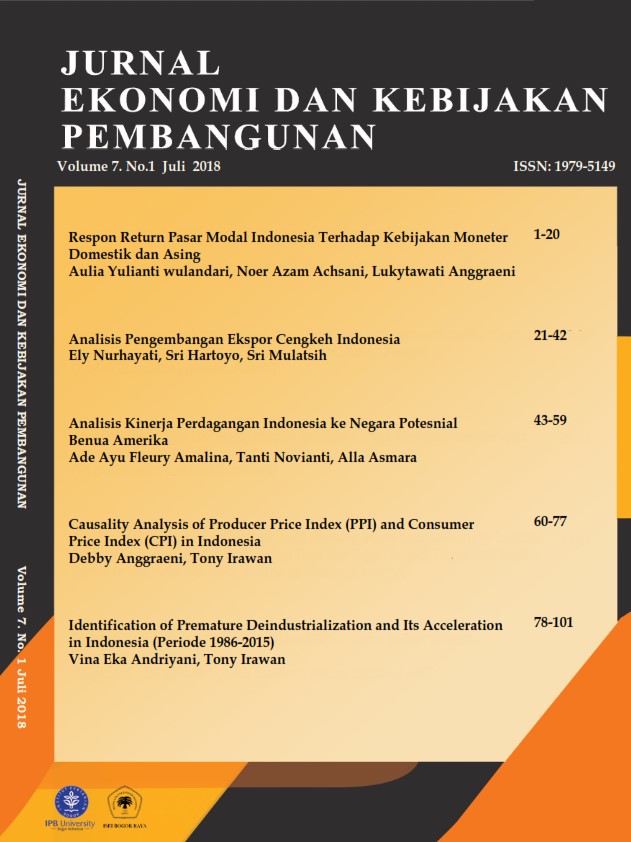Analisis Kinerja Perdagangan Indonesia ke Negara Potensial Benua Afrika
Abstract
Trade liberalization generates higher commodity export opportunities between countries. The export opportunities to the African countries are evidenced by the high average growth of the total export values from Indonesia to Africa in 2011-2016, amounting to 5.886%. The aim of this research is to determine the potential importing African countries through the identification of export value and share, evaluate the performance and trade integration between Indonesia and the African countries through RCA, EPD and IIT methods. The results showed that South Africa with commodities like HS 71, 15, 40, 87 and 84 and Egypt with HS 15, 55, 40, 48 and 84, could be potential export destinations for Indonesia in 2011-2016. The Indonesian HS 71, 15 and 40 commodities in South Africa and Egypt i.e. HS 15, 55, 40, and 48, face tremendous competitivity. The potential Indonesian commodities in the South African market with HS codes of 15, 84, and 87 were considered as Falling Star while HS 71 and 40 were in retreating position. The HS 15 and 55 in the Egyptian market were in the position of Falling Star, with HS 40, 48, and 84 in the Retreat position. In South Africa, the HS commodities 71, 15, 40 and HS 87 were weakly integrated while the HS 50 had a strong integration.
Keywords: African, RCA, EPD, IIT
JEL classification: C23, F10, F13
References
Austria, M. 2004. The Pattern of IntraASEAN Trade in Priority Good Sectors. ASEAN Sekretariat. Jakarta.
Esterhuizen, D. 2006. An Evaluation of The Competitiveness of The South African Agribusiness Sector. University of Pretoria.
Firdaus, A.H. 2010. Kinerja Perdagangan dan Dampak Free Trade Area (FTA) ASEAN Plus Three terhadap Perekonomian Indonesia. [Tesis]. Program Pascasarjana, Institut Pertanian Bogor, Bogor.
Kemendag (Kementerian Perdagangan). 2016. Direktorat Jenderal Perdagangan Luar Negeri. www.kemendag.go.id [Agustus 2016].
Krugman P.R., Obstfeld, M. 2009. International Economics: Theory & Policy. Clinton D, editor. Boston (US): The AddisonWesley. Ed ke-8.
Oktaviani R., Novianti T. 2009. Teori Perdagangan Internasional dan Aplikasinya di Indonesia Bagian I. Bogor (ID): Departemen Ilmu Ekonomi, Institut Pertanian Bogor.
Ricky, Rinaldi. 2014. Analisis Daya Saing dan Faktor-Faktor yang Mempengaruhi Aliran Perdagangan Komoditi Unggulan Ekspor Indonesia ke Afrika Selatan. [Tesis]. Program Pascasarjana, Institut Pertanian Bogor, Bogor.
Rizka Suci Rahmadhani. 2017.Analisis Potensi Ekspor Ikan Sarden Indonesia di Negara-Negara Afrika Periode Tahun 2010 sampai 2014. [Tesis]. Program Pascasarjana, Institut Pertanian Bogor, Bogor.
Simatupang, P.1991. The Conception of Domestic Resource Cost and Net Economic Benefit for Comparative Advantage Analysis Agribusiness. Division Working Paper. 2:91.
Stolovitch, Harold, D. dan Keeps, E.J. 1992. Handbook of Human Performance Technology A Comprehensive Guide for Analysis and Solving Performance Problem in Organizations. San Francisco: Jersey-Bass Publisher
WITS (World Intregated Trade Solution). 2017. World Development Indicators. http://www.wits.worldbank.org. [ Januari 2017].
Authors

This work is licensed under a Creative Commons Attribution-NonCommercial-ShareAlike 4.0 International License.
The authors who publis article(s) in Jurnal Ekonomi and Kebijakan Pembangunan have to understand and agree that the copyright of article published is owned by Jurnal ekonomi and Kebijakan pembangunan including to reproduce, distribute and sell this journal to public.





